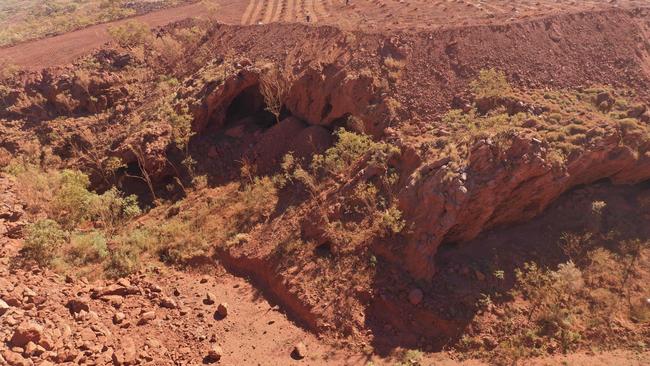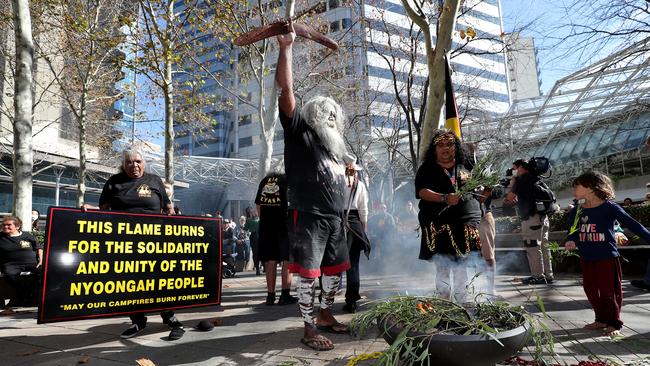Rio corporate culture failures made Juukan Gorge blast ‘almost inevitable’ says parliamentary inquiry
Rio Tinto was ‘at best’ incompetent and at worst deliberately deceived traditional owners over plans to blast Juukan Gorge, according to a parliamentary inquiry.

Rio Tinto was “at best” incompetent and at worst deliberately deceived traditional owners over plans to blast Juukan Gorge, according to the parliamentary inquiry into the debacle, with key government members of the committee calling for a formal judicial review into Rio’s actions.
The parliamentary inquiry into Rio Tinto’s destruction of the Juukan Gorge rock shelters delivered its final report on Monday, recommending sweeping legislative changes across the country to prevent a repeat of the event.
The report puts the mining industry on notice about their dealings with traditional owners, setting out a road map for a higher standard when it comes to sensitive sites.
Speaking on Monday in Canberra, the chairman of the Joint Standing Committee on Northern Australia, Queensland LNP MP Warren Entsch, said it was critical that key elements of the UN Declaration on the Rights of Indigenous Peoples (UNDRIP) now be enshrined in heritage legislation across the country.
Mr Entsch said the destruction of the Juukan Gorge sites caused “immeasurable cultural and spiritual loss, as well as profound grief for the Puutu Kunti Kurrama and Pinikura peoples (PKKP)”, the traditional owners of the sites.
The committee’s final report put the blame for the decision to destroy the 46,000 heritage sites firmly on Rio’s quest to make quick bucks, savaging the company’s lack of regard for its social responsibilities in the lead up to the reputational disaster.
Former Rio boss Jean-Sebastien Jacques – who stood down in late 2020, along with iron ore boss Chris Salisbury and corporate affairs head Simone Niven – escapes direct criticism in the majority report of the committee.


But the corporate culture put in place by the trio came under heavy fire, with the report saying the mining giant’s poor internal processes made the destruction of the Juukan Gorge heritage sites “almost inevitable”.
“Changes to the corporate structure of Rio Tinto introduced in 2016 by the then CEO saw appropriately skilled and experienced staff replaced with less experienced and unsuitably qualified replacements, resulting in a drop in adherence to internal standards and an organisational culture focused around securing quick and easy approvals,” the report says.
Rio Tinto CEO Jakob Stausholm said the miner had been working hard to rebuild trust and meaningful relationships with the PKKP people and other traditional owners. “Rio Tinto is absolutely committed to listening, learning and showing greater care, and this remains a top priority,” he said.
The reports cites a litany of failures by Rio ahead of the Brockman mine detonation in May 2020 – including initially telling the wrong Aboriginal corporation in 2013 about its intention to blast the site, failing to incorporate new archaeological evidence into its thinking around the same time, and cites allegations – contested by Rio – that PKKP representatives had been assured the rock shelters were safe only a few months ahead of their destruction.
Rio’s decision making in the lead up to the blasting of Juukan Gorge represented “at best, corporate incompetence or, at worst, deliberate corporate misdirection leading to the deception of a group of Aboriginal peoples and the destruction of their sacred heritage”, the report says.
“This chapter provides a case study in, at best, corporate incompetence or, at worst, deliberate corporate misdirection leading to the deception of a group of Aboriginal peoples and the destruction of their sacred heritage,” the report says.
“State and Commonwealth legislative frameworks enabled Rio Tinto to exercise excessive power over the PKKP peoples in negotiation, but it was Rio Tinto’s internal processes that made the destruction of the Juukan Gorge heritage sites almost inevitable.”

But, while the majority committee report stopped short of assigning blame to any individual working with Rio, a minority opinion issued by two government committee members – WA Liberal Senator Dean Smith and Queensland LNP MP George Christensen – went further, calling for a formal judicial review of Rio’s actions.
“Actions by Rio Tinto leading to the destruction of Aboriginal heritage at Juukan Gorge were disgraceful, negligent and wilful – and the executive leadership of the company must be held to account,” the minority report said.
“More than a year has passed, yet Rio Tinto and its board have fundamentally been let off the hook for obliterating the 46,000-year-old site in WA’s Pilbara region.”
While Senator Smith said he recognised that Rio had taken “decisive” steps to strengthen its internal processes and modernise its agreements, he said recent criticism of Rio by Indigenous groups, published in Rio’s Communities and Social Performance report last month, suggested further investigation of Juukan Gorge was necessary.
“Despite the outrage shown in Australia and beyond, no impactful financial penalty or regulatory sanction has been imposed on Rio to date,” the minority report said.
“There should be a judicial inquiry into the destruction of the site, investigating if conduct preceding or following the event warrants further action – including criminal charges.”
Speaking in parliament on Monday, Mr Entsch said Rio had been forthcoming in its evidence to the committee, even when it was not to its advantage.
“I’d like to think that Juukan Gorge marks a turning point of that company and the mining industry as a whole,” he said.
But Mr Entsch said it was clear that wholesale changes to the legislative regime governing Indigenous heritage issues were needed to prevent a similar disaster occurring again.
Traditional owner groups would have the power to sue mining companies over the destruction of heritage sites, under the sweeping legal reforms recommended by the majority report.
The final report recommends the federal Minister for Indigenous Australians become responsible for all Aboriginal and Torres Strait Islander cultural heritage matters, and says legislation is needed to set minimum standards for all heritage laws.
A spokesman for the PKKP Aboriginal Corporation said in a statement that traditional owners would take time to consider the report and its recommendations.




To join the conversation, please log in. Don't have an account? Register
Join the conversation, you are commenting as Logout